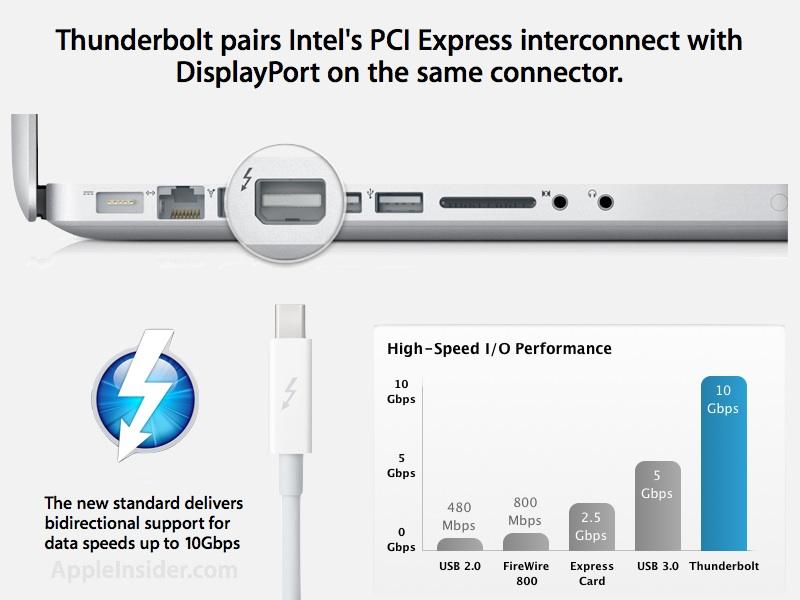While Apple has integrated Intel's Thunderbolt connection standard in every model of Mac the company has introduced since 2011, the technology has yet to truly take off in the computer industry, and one report says it is languishing due to Intel's tight controls over the standard.
Update: Intel contacted AppleInsider to express the chipmaker's reservations with the information presented in DigiTimes' report. The company's response to the report is detailed in this feature piece.
Apple brought Thunderbolt to the Mac shortly after Intel officially introduced the technology, which the two companies developed in collaboration. Thunderbolt allowed for speeds 12 times faster than FireWire 800 and twice as fast as USB 3.0, as well as the ability to daisy-chain multiple devices without using a hub.
Apple secured an exclusive license on the technology shortly following its unveiling. Even when that license expired, though, other PC manufacturers didn't begin to adopt the standard en masse.
Additionally, the number of peripherals supporting the standard has been well below what some expected given its specifications. A research note from DigiTimes points the finger at Intel's unwillingness so far to license the technology behind Thunderbolt to other parties, a factor that keeps the cost of Thunderbolt high and wider adoption low.
Intel, according to the report, uses independent packaging for Thunderbolt chips, and the chipmaker maintains a tight grip on the technology. The specialized chips Intel places near Thunderbolt configurators are proprietary designs, meaning that Intel can maintain control over the pricing on Thunderbolt cables.
A four-channel Thunderbolt chip component has a wholesale price of $35, while a two-meter Thunderbolt cable has a recommended retail price of $39. These price points are keeping some smaller manufacturers from entering the Thunderbolt device segment, leaving it largely to established players.
Other chipmakers, including ASMedia, are trying to convince Intel to license the silicon intellectual property rights related to Thunderbolt. Licensing the technology, they argue, would allow other companies to make smaller-sized and cheaper peripherals. Intel has yet to respond publicly to such requests.
 Kevin Bostic
Kevin Bostic








 Charles Martin
Charles Martin
 Christine McKee
Christine McKee
 Wesley Hilliard
Wesley Hilliard
 Malcolm Owen
Malcolm Owen
 Andrew Orr
Andrew Orr
 William Gallagher
William Gallagher
 Sponsored Content
Sponsored Content








54 Comments
I think the expense keeps devices and consumers way as well. It may be fast, but its also expensive. If I remember correctly FireWire was the same way with both devices and price when it first came about and has sense gotten cheaper. I'd like to think there will be more devices in the future as its a great technology.
This is, indeed, what held FireWire back. It might be too late to fix it by now, too; Apple eventually let go of some of its grip on FireWire and made it more attractive to peripheral makers, but by that time USB 2.0 had come out and was "good enough." Now, USB 3.0 is out and is "good enough," and Thunderbolt doesn't even have the depth of support that FireWire had in its early days. Thunderbolt is, sadly, probably DOA at this point.
It's so frustrating to see people repeat the mistakes of the past.
Licensing the silicon IP rights would be a bad idea. What's needed here is simply lower licensing fees and chip prices. Since intel is doing poorly lately, I would suspect that what's happening here is that they are pricing the chips so as to recoup what they feel is their "investment" in developing the technology. Basically keeping the price high to make their books look good and to pay for research that probably isn't even related at all. R&D costs however are the biggest boondoggle that ever existed and can easily be quoted to be anything from nothing at all to 90% of the cost of the chip. Most modern thinking on this says that R&D costs should actually *never* be added into product cost but rather absorbed by the company as basic operating costs.
It's meant more for the Professional market, at least that's what the majority of the devices on the market are geared towards. There are PCI expansion boxes that are kind of expensive but geared towards the professionals. The external hard drives are pretty much RAID systems which are geared for professionals. There are boxes like Universal Audio which is geared towards the Professional market. Then there are these new Belkin docking boxes, which are more expensive than a typical USB hub, but much more functional. Apple was smart in integrating this technology and so far it gives Apple a differentiator that makes a difference for the professional markets, Apple just needs to squeeze out a MacPro that's Thunderbolt equipped as fast as possible to keep their high end tower workstation market.
It's meant more for the Professional market, at least that's what the majority of the devices on the market are geared towards.
FireWire ended up with a following in the professional market, too, and a much more widespread one than Thunderbolt now has, but I think we all agree that it could have done far better.